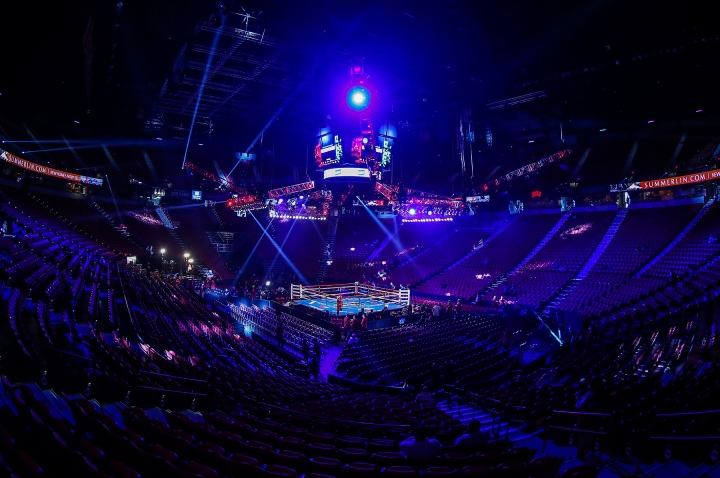By Corey Erdman
Seventeen years ago, Srisaket Sor Rungvisai and his girlfriend hid in a storage wagon and made their way to Bangkok. Without any money, with few belongings and no food, Sor Rungvisai, born Wisaksil Wangek, believed the way to prosperity was through fighting.
Opportunities for a 13 year old street kid in Bangkok were minimal, but he managed to walk 60 miles to a grocery store, where he was given a job picking up trash. It didn't pay much, but it allowed him to scavenge scraps out of the garbage to eat. When holidays rolled around, and he was given five extra cents on his paycheck, he and his lover would splurge. The two would buy a pack of instant noodles—he would drink the broth, and she would eat the noodles.
Despite a starvation diet, as every boxing story goes, he found his way to a gym and began changing his life. Even a 1-3-1 start to his professional career didn't deter him from believing that he one day wouldn't be relegated to eating what others threw away, and would be a visible member of society.
Fast forward to 2017. Those 60 mile walks to work have turned to daily 13 mile training runs, and he's flying first-class to Los Angeles, he's shaking hands with the Prime Minister of Thailand, he's a world champion, and now he's beaten Roman Gonzalez, one of the best fighters in the world, twice.
Sor Rungvisai knocked Gonzalez out cold in the fourth round of the WBC super flyweight title rematch on Saturday night at StubHub Center in Carson, California.
There are many ways to analyze a boxing match—ways to interpolate it, ways to reduce it. But one way of looking at boxing that will always be accurate is as a study and realization of limitations.

Sor Rungvisai's story is equal parts heart wrenching, captivating and inspirational. His might be among the most shocking in terms of the extremity of his circumstances, but there are thousands upon thousands of active fighters who have overcome poverty anywhere on the scale from gridning to abject. While the odds still aren't favorable, boxing is a place where “The American Dream,” so to speak, can be realized. Nothing in this world is a true meritocracy, but stories like Srisaket Sor Rungvisai's show us that in boxing, one's limitations are at least somewhere beyond where you think they are.
Roman Gonzalez has believed that throughout his career as well. His sad outcome on Saturday night illustrated another one of boxing harsh truths: Even if those limitations are beyond where people thought they were, they do exist.
“Chocolatito” found out where his limitations were. They stood twelve years, four weight classes and 48 fights beyond where he started his professional career, wearing yellow trunks and throwing 100 malicious punches per round.
Few fighters in the modern era have challenged themselves the way Gonzalez has. Even before debuting on HBO and becoming known by the North American audience though a hellacious lineup of fights against Sor Rungvisai, Carlos Cuadras, Brian Viloria, McWilliams Arroyo and Edgar Sosa, he was fighting the best fighters in the world south of 115 pounds in Central America and Asia.
Gonzalez was the consensus best fighter in the world at 105, 108 and 112, beating divisional stalwarts Katsunari Takayama, Juan Francisco Estrada, Akira Yaegashi and more. Life in the smaller weight divisions is a lot like living on the streets and picking up trash for meals, in fact. You take whatever you can get, because you never know when the next opportunity is going to come along, and because every individual opportunity isn't fruitful enough on its own to relish them.
“I can fight whoever. I’m not scared of anyone. I’ll fight whoever," said Sor Rungvisai in his post-fight interview with HBO's Max Kellerman.
The first bout between Gonzalez and Sor Rungvisai was a Compubox-busting bloodbath at Madison Square Garden, one which the Thai slugger won, but many not with an official scorecard believed Chocolatito had edged. In retrospect, it's easy to see how a hellacious fight in which Gonzalez absorbed 277 power punches in the twilight of his career at the heaviest weight class he's ever fought at would erode him considerably.
After the first round of the rematch, HBO commentators Kellerman, Jim Lampley and Andre Ward began remarking that Gonzalez, a future first ballot Hall of Famer, didn't look as confident as he had in the past, or even in the previous bout.
That moment, when the bell had rang and Sor Rungvisai, after eating 371 of his power punches in the first fight was undeterred and throwing thunderous shots to the body, was likely the moment Gonzalez realized that he had reached his limitations.
It was eerily reminiscent of the second bout between Aaron Pryor and Gonzalez's mentor and hero Alexis Arguello, which just so happened to take place 34 years earlier to the day.
Gonzalez seemed to have a worried look on his face, but never stopped throwing punches at a man he couldn't hurt, seemingly knowing that at some point, it would leave him open to be knocked out. In the fourth round, that's exactly what happened.
Chocolatito and Sor Rungvisai exhibited what's special about boxing, and more specifically, the truly great fighters of the sport. They're willing to find out exactly where the threshold is, the line that they just can't cross. The pursuit of greatness, even when failure is a near-inevitability.
For Gonzalez, it was far beyond where most fighters in the history of the sport will ever reach.
And for Sor Rungvisai, it's far beyond the dumpsters of Bangkok, and where it was ever thought possible for someone who started out there.

ADD COMMENT VIEW COMMENTS (30)